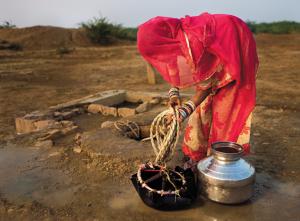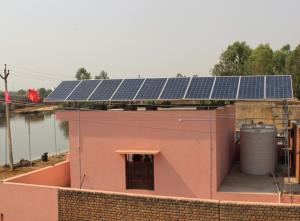Vital To India’s Future
Marilyn Smith is Executive Director of EnAct.
Lead image: One hundred and sixty-eight million households in India lack access to treated drinking water. More than ninety percent are in rural areas. The belief that 'healthy children make healthy nations' drives the mission of Grassroots and Rural Innovative Development (G.R.I.D.) Pvt. Ltd. Enabling access to clean drinking water through clean, affordable energy is a critical first step. Photo: G.R.I.D. / India

People in India's rural areas often have to rely on ground water that is highly unfit for drinking and only available at long distances. Water insecurity contributes to negative health impacts, time poverty and gender disparity.
By 2022, India expected to surpass China as the world's most populous nation, reaching one and a half billion by 2030. This translates into two hundred and fifty million young people ready to enter the workforce in an economy that has been boasting seven percent growth for most of the past two decades.
But ensuring a healthy workforce for the future is a challenge that must be tackled today, as widespread lack of access to safe drinking water has serious knock-on effects for children. Recurring bouts of diarrhea often cause malnutrition, ultimately leading to stunted physical and mental development, which undermines the chance that rural children will break the cycles of extreme poverty and be able to fully participate in India's promising future.
Recognizing that proven filtration solutions, such as reverse osmosis (RO), are often not feasible in rural areas due to economic barriers, Manik Jolly, Founder and CEO of G.R.I.D., set out to address the underlying problem: lack of access to affordable energy.
 A ten-kilowatt array of rooftop solar panels is sufficient to circumvent unreliable electricity supply to run the RO plant independently. Photo: G.R.I.D. / India
A ten-kilowatt array of rooftop solar panels is sufficient to circumvent unreliable electricity supply to run the RO plant independently. Photo: G.R.I.D. / India
Capitalizing on the low levelized cost of electricity for solar in India, G.R.I.D.'s innovative RO system relies exclusively on solar power and can provide 10 liters of water for less than $0.04. Importantly, G.R.I.D. integrates technology, financial modeling, and operating and maintenance practices to ensure that villagers can own and operate their own system.
As a social enterprise, G.R.I.D. also seeks to measure the social and economic impacts of its projects, including how access to clean drinking water leads to:
- Improved health indicators and quality of life in villages.
- Reduced time poverty and overall empowerment for women.
- Equal participation of men in managing household water resources, reducing the burden on women.
Since G.R.I.D. installed its pilot RO system in the village of Ugalan in the state of Haryana (approximately one hundred and thirty kilometers from New Delhi), citizens report positive impacts in all of these areas.
In addition to plans to scale up the solar RO system, G.R.I.D. has active projects in solar microgrids, solar lanterns and solar home systems (see www.grid-india.net). Where possible, they also aim to provide enough power for commercial activity and digital connectivity.
"India is on the verge of reaping benefits of its demographic dividend," says Mr. Jolly. "If we want to reach the shown economic potential, we cannot afford to neglect the basic health of the next generation."
For more information on EnAct, visit our websites www.en-act.org or www.coldathome.today, or email marilyn.smith@en-act.org.


